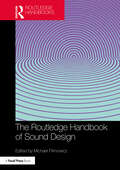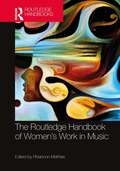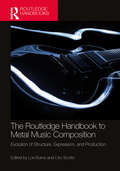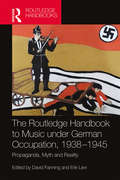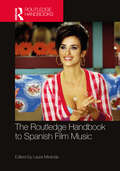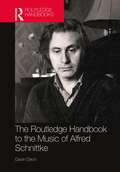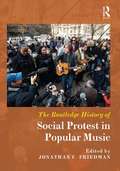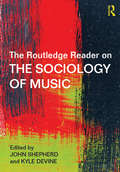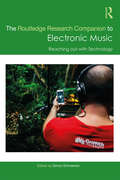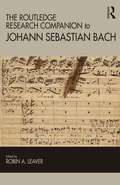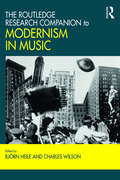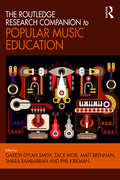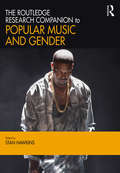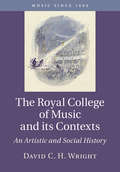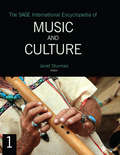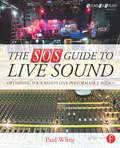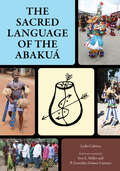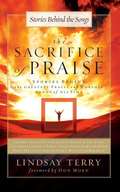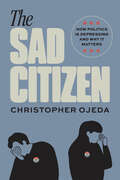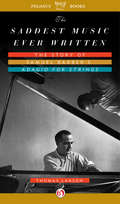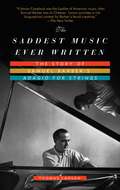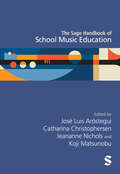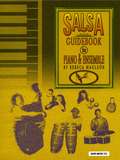- Table View
- List View
The Routledge Handbook of Sound Design
by Michael FilimowiczThe Routledge Handbook of Sound Design offers a comprehensive overview of the diverse contexts of creativity and research that characterize contemporary sound design practice. Readers will find expansive coverage of sound design in relation to games, VR, globalization, performance, soundscape and feminism, amongst other fields.Half a century since its formal emergence, this book considers sound design in a plethora of practical contexts, including music, film, soundscape and sonification, as well as the emerging theoretical and analytical approaches being used in scholarship on the subject. The Routledge Handbook of Sound Design tracks how ideas and techniques have migrated from one field to the next, as professionals expand the industry applications for their skills and knowledge, and technologies produce new form factors for entertainment and information.Collectively, the chapters included in this volume illustrate the robustness and variety of contemporary sound design research and creativity, making The Routledge Handbook of Sound Design essential reading for students, teachers, researchers and practitioners working on sound design in its many forms.
The Routledge Handbook of Women’s Work in Music (Routledge Music Handbooks)
by Rhiannon MathiasThe Routledge Handbook of Women’s Work in Music presents a unique collection of core research by academics and music practitioners from around the world, engaging with an extraordinarily wide range of topics on women’s contributions to Western and Eastern art music, popular music, world music, music education, ethnomusicology as well as in the music industries. The handbook falls into six parts. Part I serves as an introduction to the rich variety of subject matter the reader can expect to encounter in the handbook as a whole. Part II focuses on what might be termed the more traditional strand of feminist musicology – research which highlights the work of historical and/or neglected composers. Part III explores topics concerned with feminist aesthetics and music creation and Part IV focuses on questions addressing the performance and reception of music and musicians. The narrative of the handbook shifts in Part V to focus on opportunities and leadership in the music professions from a Western perspective. The final section of the handbook (Part VI) provides new frames of context for women’s positions as workers, educators, patrons, activists and promoters of music. This is a key reference work for advanced undergraduates, postgraduates and researchers in music and gender.
The Routledge Handbook to Metal Music Composition: Evolution of Structure, Expression, and Production (Routledge Music Handbooks)
by Lori Burns Ciro ScottoThe Routledge Handbook to Metal Music Composition: Evolution of Structure, Expression, and Production examines metal music composition as a distinct practice that combines a complex array of formal musical, expressive, and technological elements. Reaching beyond the limitations of applying common-practice theories of tonality to metal, this volume brings together a wide range of established and emerging scholars to address the building blocks of metal composition in the context of metal’s subgenres and evolution over time. Together, the chapters provide a holistic theoretical framework for understanding the distinctive compositional features of metal.With contributions from an international group of experts, the handbook is organized into four parts around major themes:• Structures, including form, riff, harmony, rhythm, and meter• Expressions and Techniques: Instruments• Expressions and Techniques: Voices• Productions, addressing the role of gear, capturing, processing, and mixing technologies.The contributors examine and discuss these elements with the goal of building an understanding of metal music composition that can also function as a manual for composing metal music. Providing a comprehensive overview of the unique musical elements of metal, this handbook is an essential resource for scholars and students across popular music studies, musicology, creative music performance and composition, songwriting, and production studies, as well as for anyone interested in understanding metal from the perspective of composition.
The Routledge Handbook to Music under German Occupation, 1938-1945: Propaganda, Myth and Reality
by Erik Levi David FanningFollowing their entry into Austria and the Sudetenland in the late 1930s, the Germans attempted to impose a policy of cultural imperialism on the countries they went on to occupy during World War II. Almost all music institutions in the occupied lands came under direct German control or were subject to severe scrutiny and censorship, the prime objective being to change the musical fabric of these nations and force them to submit to the strictures of Nazi ideology. This pioneering collection of essays is the first in the English language to look in more detail at the musical consequences of German occupation during a dark period in European history. It embraces a wide range of issues, presenting case studies involving musical activity in a number of occupied European cities, as well as in countries that were part of the Axis or had established close diplomatic relations with Germany. The wartime careers and creative outputs of individual musicians who were faced with the dilemma of either complying with or resisting the impositions of the occupiers are explored. In addition, there is some reflection on the post-war implications of German occupation for the musical environment in Europe. Music under German Occupation is written for all music-lovers, students, professionals and academics who have particular interests in 20th-century music and/or the vicissitudes of European cultural life during World War II.
The Routledge Handbook to Spanish Film Music (Routledge Music Handbooks)
by Laura MirandaThe Routledge Handbook to Spanish Film Music provides a significant contribution to the research and history of Spanish film music, exploring the interdependence and ways in which discourses of sound and vision are constructed dialogically in Spanish cinema, with contributions from leading international researchers from Spain, the USA, the UK, France and Germany.Offering a multifocal and multidisciplinary study between related areas such as music studies, film studies and Spanish cultural studies, this book is divided into four sections, covering the early years of Spanish cinema; the 1940s and 1950s in Spanish cinema—the first decades of the Franco dictatorship; the importance of Fraga Iribarne’s slogan, “Spain is different,” to promote Spain’s new openness to the world in the 1960s and 1970s; and Spanish cinema since the arrival of democracy in 1978, including discussion of contemporary Spanish cinema.The growing interest in Spanish cinema calls for the publication of studies about the role of music in its political and socio-cultural framework. This is therefore a valuable text for music and film scholars and professionals, university undergraduates and music conservatory students.
The Routledge Handbook to the Music of Alfred Schnittke (Routledge Russian and East European Music and Culture)
by Gavin DixonThe Routledge Handbook to the Music of Alfred Schnittke is a comprehensive study of the work of one of the most important Russian composers of the late 20th century. Each piece is discussed in detail, with particular attention to the composer’s groundbreaking polystylism, as well as his unique approach to musical symbolism and his deep engagement with Christian themes. This is the first publication to look at Schnittke’s output in its entirety, and for most works it represents either the first ever published analysis or the first in a language other than Russian. The volume presents new research from the Ivashkin-Schnittke Archive at Goldsmiths, University of London and the collection of Schnittke’s compositional sketches at the Julliard Library in New York. It also draws on the substantial research on Schnittke’s music published in the Russian language. Including a work list and bibliography of primary and secondary sources, this is an essential reference for all those interested in Russian music, 20th-century music and performance studies.
The Routledge History of Social Protest in Popular Music
by Jonathan C. FriedmanThe major objective of this collection of 28 essays is to analyze the trends, musical formats, and rhetorical devices used in popular music to illuminate the human condition. By comparing and contrasting musical offerings in a number of countries and in different contexts from the 19th century until today, The Routledge History of Social Protest in Popular Music aims to be a probing introduction to the history of social protest music, ideal for popular music studies and history and sociology of music courses.
The Routledge Reader on the Sociology of Music
by John Shepherd and Kyle DevineThe Routledge Reader on the Sociology of Music offers the first collection of source readings and new essays on the latest thinking in the sociology of music. Interest in music sociology has increased dramatically over the past decade, yet there is no anthology of essential and introductory readings. The volume includes a comprehensive survey of the field’s history, current state and future research directions. It offers six source readings, thirteen popular contemporary essays, and sixteen fresh, new contributions, along with an extended Introduction by the editors. The Routledge Reader on the Sociology of Music represents a broad reference work that will be a resource for the current generation of sociologically inclined musicologists and musically inclined sociologists, whether researchers, teachers or students.
The Routledge Research Companion to Electronic Music: Reaching out with Technology (Routledge Music Companions)
by Simon EmmersonThe theme of this Research Companion is 'connectivity and the global reach of electroacoustic music and sonic arts made with technology'. The possible scope of such a companion in the field of electronic music has changed radically over the last 30 years. The definitions of the field itself are now broader - there is no clear boundary between 'electronic music' and 'sound art'. Also, what was previously an apparently simple divide between 'art' and 'popular' practices is now not easy or helpful to make, and there is a rich cluster of streams of practice with many histories, including world music traditions. This leads in turn to a steady undermining of a primarily Euro-American enterprise in the second half of the twentieth century. Telecommunications technology, most importantly the development of the internet in the final years of the century, has made materials, practices and experiences ubiquitous and apparently universally available - though some contributions to this volume reassert the influence and importance of local cultural practice. Research in this field is now increasingly multi-disciplinary. Technological developments are embedded in practices which may be musical, social, individual and collective. The contributors to this companion embrace technological, scientific, aesthetic, historical and social approaches and a host of hybrids – but, most importantly, they try to show how these join up. Thus the intention has been to allow a wide variety of new practices to have voice – unified through ideas of 'reaching out' and 'connecting together' – and in effect showing that there is emerging a different kind of 'global music'.
The Routledge Research Companion to Johann Sebastian Bach
by Robin A LeaverThe Ashgate Research Companion to Johann Sebastian Bach provides an indispensable introduction to the Bach research of the past thirty-fifty years. It is not a lexicon providing information on all the major aspects of Bach's life and work, such as the Oxford Composer Companion: J. S. Bach. Nor is it an entry-level research tool aimed at those making a beginning of such studies. The valuable essays presented here are designed for the next level of Bach research and are aimed at masters and doctoral students, as well as others interested in coming to terms with the current state of Bach research. Each author covers three aspects within their specific subject area; firstly, to describe the results of research over the past thirty-fifty years, concentrating on the most significant and controversial, such as: the debate over Smend's NBA edition of the B minor Mass; Blume's conclusions with regard to Bach's religion in the wake of the 'new' chronology; Rifkin's one-to-a-vocal-part interpretation; the rediscovery of the Berlin Singakademie manuscripts in Kiev; the discovery of hitherto unknown manuscripts and documents and the re-evaluation of previously known sources. Secondly, each author provides a critical analysis of current research being undertaken that is exploring new aspects, reinterpreting earlier assumptions, and/or opening-up new methodologies. For example, Martin W. B. Jarvis has suggested that Anna Magdalena Bach composed the cello suites and contributed to other works of her husband - another controversial hypothesis, whose newly proposed forensic methodology requires investigation. On the other hand, research into Bach's knowledge of the Lutheran chorale tradition is currently underway, which is likely to shed more light on the composer's choices and usage of this tradition. Thirdly, each author identifies areas that are still in need of investigation and research.
The Routledge Research Companion to Modernism in Music
by Charles Wilson Björn HeileModernism in music still arouses passions and is riven by controversies. Taking root in the early decades of the twentieth century, it achieved ideological dominance for almost three decades following the Second World War, before becoming the object of widespread critique in the last two decades of the century, both from critics and composers of a postmodern persuasion and from prominent scholars associated with the ‘new musicology’. Yet these critiques have failed to dampen its ongoing resilience. The picture of modernism has considerably broadened and diversified, and has remained a pivotal focus of debate well into the twenty-first century. This Research Companion does not seek to limit what musical modernism might be. At the same time, it resists any dilution of the term that would see its indiscriminate application to practically any and all music of a certain period. In addition to addressing issues already well established in modernist studies such as aesthetics, history, institutions, place, diaspora, cosmopolitanism, production and performance, communication technologies and the interface with postmodernism, this volume also explores topics that are less established; among them: modernism and affect, modernism and comedy, modernism versus the ‘contemporary’, and the crucial distinction between modernism in popular culture and a ‘popular modernism’, a modernism of the people. In doing so, this text seeks to define modernism in music by probing its margins as much as by restating its supposed essence.
The Routledge Research Companion to Popular Music Education
by Gareth Dylan Smith Matt Brennan Phil Kirkman Shara Rambarran Zack MoirPopular music is a growing presence in education, formal and otherwise, from primary school to postgraduate study. Programmes, courses and modules in popular music studies, popular music performance, songwriting and areas of music technology are becoming commonplace across higher education. Additionally, specialist pop/rock/jazz graded exam syllabi, such as RockSchool and Trinity Rock and Pop, have emerged in recent years, meaning that it is now possible for school leavers in some countries to meet university entry requirements having studied only popular music. In the context of teacher education, classroom teachers and music-specialists alike are becoming increasingly empowered to introduce popular music into their classrooms. At present, research in Popular Music Education lies at the fringes of the fields of music education, ethnomusicology, community music, cultural studies and popular music studies. The Ashgate Research Companion to Popular Music Education is the first book-length publication that brings together a diverse range of scholarship in this emerging field. Perspectives include the historical, sociological, pedagogical, musicological, axiological, reflexive, critical, philosophical and ideological.
The Routledge Research Companion to Popular Music and Gender
by Stan HawkinsWhy is gender inseparable from pop songs? What can gender representations in musical performances mean? Why are there strong links between gender, sexuality and popular music? The sound of the voice, the mix, the arrangement, the lyrics and images, all link our impressions of gender to music. Numerous scholars writing about gender in popular music to date are concerned with the music industry’s impact on fans, and how tastes and preferences become associated with gender. This is the first collection of its kind to develop and present new theories and methods in the analysis of popular music and gender. The contributors are drawn from a range of disciplines including musicology, sociology, anthropology, gender studies, philosophy, and media studies, providing new reference points for studies in this interdisciplinary field. Stan Hawkins’s introduction sets out to situate a variety of debates that prompts ways of thinking and working, where the focus falls primarily on gender roles. Amongst the innovative approaches taken up in this collection are: queer performativity, gender theory, gay and lesbian agency, the female pop celebrity, masculinities, transculturalism, queering, transgenderism and androgyny. This Research Companion is required reading for scholars and teachers of popular music, whatever their disciplinary background.
The Royal College of Music and its Contexts: An Artistic and Social History (Music since 1900)
by David C. WrightLocated between the great Victorian museums of South Kensington and the Royal Albert Hall, the Royal College of Music, founded in 1883, has been a central influence on British musical life ever since. This wide-ranging account places the College within its musical and educational environments. It argues that the RCM's significance lies not only in its famous performers and composers, but also the generations of its more anonymous former students who have done so much to improve the musical life of the localities in which they have worked as teachers and animateurs. As a cultural history, this account also captures how significantly society's consumption of music - from new technologies to the altered perspectives of historical and world musics - has changed since the College was founded, and how very different our points of musical reference now are. This study traces the effects of such developments on the College's work.
The SAGE International Encyclopedia of Music and Culture
by Janet L. SturmanThe SAGE Encyclopedia of Music and Culture presents key concepts in the study of music in its cultural context and provides an introduction to the discipline of ethnomusicology, its methods, concerns, and its contributions to knowledge and understanding of the world's musical cultures, styles, and practices. The diverse voices of contributors to this encyclopedia confirm ethnomusicology's fundamental ethos of inclusion and respect for diversity. Combined, the multiplicity of topics and approaches are presented in an easy-to-search A-Z format and offer a fresh perspective on the field and the subject of music in culture. Key features include: Approximately 730 signed articles, authored by prominent scholars, are arranged A-to-Z and published in a choice of print or electronic editions Pedagogical elements include Further Readings and Cross References to conclude each article and a Reader’s Guide in the front matter organizing entries by broad topical or thematic areas Back matter includes an annotated Resource Guide to further research (journals, books, and associations), an appendix listing notable archives, libraries, and museums, and a detailed Index The Index, Reader’s Guide themes, and Cross References combine for thorough search-and-browse capabilities in the electronic edition
The SAGE International Encyclopedia of Music and Culture
by Janet L. SturmanThe SAGE Encyclopedia of Music and Culture presents key concepts in the study of music in its cultural context and provides an introduction to the discipline of ethnomusicology, its methods, concerns, and its contributions to knowledge and understanding of the world's musical cultures, styles, and practices. The diverse voices of contributors to this encyclopedia confirm ethnomusicology's fundamental ethos of inclusion and respect for diversity. Combined, the multiplicity of topics and approaches are presented in an easy-to-search A-Z format and offer a fresh perspective on the field and the subject of music in culture. Key features include: Approximately 730 signed articles, authored by prominent scholars, are arranged A-to-Z and published in a choice of print or electronic editions Pedagogical elements include Further Readings and Cross References to conclude each article and a Reader’s Guide in the front matter organizing entries by broad topical or thematic areas Back matter includes an annotated Resource Guide to further research (journals, books, and associations), an appendix listing notable archives, libraries, and museums, and a detailed Index The Index, Reader’s Guide themes, and Cross References combine for thorough search-and-browse capabilities in the electronic edition
The SOS Guide to Live Sound: Optimising Your Band's Live-Performance Audio (Sound On Sound Presents...)
by Paul WhiteIf you’ve ever handled live sound, you know the recipe for creating quality live sound requires many steps. Your list of ingredients, shall we say, requires an understanding of sound and how it behaves, the know-how to effectively use a sound system), and the knowledge to choose and use your gear well. Add a dash of miking ability, stir in a pinch of thinking on your feet for when your system starts to hum or the vocals start to feed back, and mix. In practice, there really is no "recipe" for creating a quality performance. Instead, musicians and engineers who effectively use sound systems have a wealth of knowledge that informs their every move before and during a live performance. You can slowly gather that knowledge over years of live performance, or you can speed up the process with The SOS Guide to Live Sound. With these pages, you get practical advice that will allow you to accomplish your live-sound goals in every performance. Learn how to choose, set up, and use a live-performance sound system. Get the basics of live-sound mixing, save money by treating your gear well with a crash course in maintenance, and fix issues as they happen with a section on problem-solving, full of real-world situations. You’ll also get information on stage-monitoring, both conventional and in-ear, along with the fundamentals of radio microphones and wireless mixing solutions. Finally, a comprehensive glossary of terminology rounds out this must-have reference.
The Sacred Language of the Abakuá
by Lydia CabreraIn 1988, Lydia Cabrera (1899–1991) published La lengua sagrada de los Ñáñigos, an Abakuá phrasebook that is to this day the largest work available on any African diaspora community in the Americas. In the early 1800s in Cuba, enslaved Africans from the Cross River region of southeastern Nigeria and southwestern Cameroon created Abakuá societies for protection and mutual aid. Abakuá rites reenact mythic legends of the institution’s history in Africa, using dance, chants, drumming, symbolic writing, herbs, domestic animals, and masked performers to represent African ancestors. Criminalized and scorned in the colonial era, Abakuá members were at the same time contributing to the creation of a unique Cuban culture, including rumba music, now considered a national treasure. Translated for the first time into English, Cabrera’s lexicon documents phrases vital to the creation of a specific African-derived identity in Cuba and presents the first “insider’s” view of this African heritage. This text presents thoroughly researched commentaries that link hundreds of entries to the context of mythic rites, skilled ritual performance, and the influence of Abakuá in Cuban society and popular music. Generously illustrated with photographs and drawings, the volume includes a new introduction to Cabrera’s writing as well as appendices that situate this important work in Cuba’s history. With the help of living Abakuá specialists in Cuba and the US, Ivor L. Miller and P. González Gómes-Cásseres have translated Cabrera’s Spanish into English for the first time while keeping her meanings and cultivated style intact, opening this seminal work to new audiences and propelling its legacy in African diaspora studies.
The Sacrifice of Praise: Stories behind the Greatest Praise and Worship Songs of All Time
by Lindsay TerryRead the inspiring tales that gave birth to fifty of today's most beloved worship songs. Includes: "Shout To The Lord," "God Will Make A Way," "Surely The Presence Of The Lord," "Great Is The Lord," "Amazing Grace..."
The Sad Citizen: How Politics Is Depressing and Why It Matters
by Christopher OjedaFor many citizens, politics is depressing. How has this come to be the norm? And, how is it influencing democracy? From rising polarization to climate change, today’s politics are leaving many Western democracies in the throes of malaise. While anger, anxiety, and fear are loud emotions that powerfully activate voters, depression is quiet, demobilizing, and less visible as a result. Yet its pervasiveness is cause for concern: after all, democracy should empower citizens. In The Sad Citizen, Christopher Ojeda draws on wide-ranging data from the United States and beyond to explain how politics is depressing, why this matters, and what we can do about it. Integrating insights from political science, sociology, psychology, and other fields, The Sad Citizen exposes the unhappy underbelly of contemporary politics and offers fresh ideas to strengthen democracy and help citizens cope with the stress of politics.
The Saddest Music Ever Written
by Thomas LarsonAn exploration of the cultural impact of Samuel Barber's Adagio for Strings, the Pietá of music, and its enigmatic composer In the first book ever to explore Samuel Barber's Adagio for Strings,music and literary critic Thomas Larson tells the story of the prodigal composer, his seminal masterpiece and its fascinating history as America's secular hymn for grieving our dead. The Adagio's sonorous intensity also speaks of the turbulent inner life of its composer, a melancholic who, in later years, descended into alcoholism and severe depression. Part biography, part cultural history, part memoir, The Saddest Music Ever Written captures the deep emotion Barber's great elegy has stirred throughout the world during its seventy-five-year history, becoming an icon of our national soul.
The Saddest Music Ever Written: The Story of Samuel Barber's Adagio for Strings
by Thomas LarsonAn exploration of the cultural impact of Samuel Barber's Adagio for Strings, the Pieta´ of music, and its enigmatic composer. "Whenever the American dream suffers a catastrophic setback, Barber's Adagio plays on the radio."--Alex Ross, author of The Rest is Noise In the first book ever to explore Samuel Barber's Adagio for Strings, music and literary critic Thomas Larson tells the story of the prodigal composer and his seminal masterpiece: from its composition in 1936, when Barber was just twenty-six, to its orchestral premiere two years later, led by the great Arturo Toscanini, and its fascinating history as America's secular hymn for grieving our dead. Older Americans know Adagio from the funerals and memorials for Presidents Roosevelt and Kennedy, Albert Einstein, and Grace Kelly. Younger Americans recall the work as the antiwar theme of the movie Platoon. Still others treasure the piece in its choral version under the name Agnus Dei. More recently, mourners heard Adagio played as a memorial to the victims of the 9/11 attacks. Barber's Adagio is truly the saddest music ever written, enrapturing listeners with its lyric beauty as few laments have. The Adagio's sonorous intensity also speaks of the turbulent inner life of its composer, Samuel Barber (1910-1981), a melancholic who, in later years, descended into alcoholism and severe depression. Part biography, part cultural history, part memoir, The Saddest Music ever Written captures the deep emotion Barber's great elegy has stirred throughout the world during its seventy-five-year history, becoming an icon of our national soul.
The Sage Handbook of School Music Education
by Catharina Christophersen José Luis Aróstegui Jeananne Nichols Koji MatsunobuThe Sage Handbook of School Music Education stands as an essential guide for navigating the evolving educational landscape in the wake of the 2008 financial crisis and the transformative impact of the COVID-19 pandemic. The handbook addresses philosophical foundations, social justice challenges, the envisioning of a transformative curriculum, and critical issues in music teacher education. Written by a diverse team of leading scholars, this handbook offers a truly global perspective with contributors from Africa, Asia, Australasia, Europe, and North and South America. The handbook engages with the profound interplay of economic, political, and social forces that shape educational policies. Scholars within this collaborative work delve into what it means to educate in a world undergoing significant changes. This entails an exploration of emerging educational approaches, considerations for societal implications, and the interconnectedness of school music education with broader curricular and global contexts. As a cohesive resource, The Sage Handbook of School Music Education not only addresses the challenges faced by educators but also envisions the transformative potential of music education in fostering creativity, inclusivity, and adaptability. This handbook serves as a compass for students, practitioners and scholars in the field, and all those passionate about navigating the complexities of redefining music education for a new era. Part 1: Foundations Part 2: Struggling for Social Justice Through Music Education Part 3: Curriculum Development Part 4: Teacher Education
The Sage Handbook of School Music Education
by Catharina Christophersen José Luis Aróstegui Jeananne Nichols Koji MatsunobuThe Sage Handbook of School Music Education stands as an essential guide for navigating the evolving educational landscape in the wake of the 2008 financial crisis and the transformative impact of the COVID-19 pandemic. The handbook addresses philosophical foundations, social justice challenges, the envisioning of a transformative curriculum, and critical issues in music teacher education. Written by a diverse team of leading scholars, this handbook offers a truly global perspective with contributors from Africa, Asia, Australasia, Europe, and North and South America. The handbook engages with the profound interplay of economic, political, and social forces that shape educational policies. Scholars within this collaborative work delve into what it means to educate in a world undergoing significant changes. This entails an exploration of emerging educational approaches, considerations for societal implications, and the interconnectedness of school music education with broader curricular and global contexts. As a cohesive resource, The Sage Handbook of School Music Education not only addresses the challenges faced by educators but also envisions the transformative potential of music education in fostering creativity, inclusivity, and adaptability. This handbook serves as a compass for students, practitioners and scholars in the field, and all those passionate about navigating the complexities of redefining music education for a new era. Part 1: Foundations Part 2: Struggling for Social Justice Through Music Education Part 3: Curriculum Development Part 4: Teacher Education
The Salsa Guidebook
by Sher Music Rebeca MauleonThe only complete method book on Salsa ever published. Numerous musical examples of how different Afro-Cuban styles are created, what each instrument does, text explaining the history and structure of the music, etc. "This will be the Salsa Bible for years to come." Sonny Bravo, Tito-Puente's pianist.
